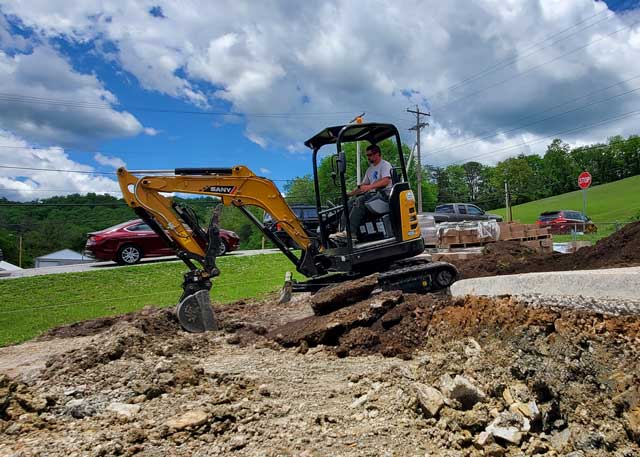Commercial Lancaster Trenching - Trenching Solutions for Businesses in Lancaster
Commercial Lancaster Trenching - Trenching Solutions for Businesses in Lancaster
Blog Article
Comprehensive Excavation Techniques: Mastering the Principles for Success
The cautious preparation, specific execution, and careful focus to detail required in excavation jobs demand a detailed method that includes numerous basic elements. The true proficiency lies not merely in understanding these principles however in effortlessly incorporating them to browse the intricacies of excavation jobs with finesse.
Understanding Excavation Project Preparation

The first stage of any kind of excavation project is the preparation phase, where crucial decisions are made that can significantly impact the outcome of the project. Understanding the job budget plan, range, and timeline restraints is vital for producing an extensive excavation strategy that makes sure the job's success.
One secret facet of excavation job planning is the advancement of a detailed timeline that lays out the sequence of due dates, activities, and turning points. By thoroughly taking into consideration all these variables throughout the planning stage, excavation tasks can be performed effectively and efficiently, leading to effective end results - dump truck companies in ohio.
Soil Analysis and Website Assessment
Carrying out thorough soil evaluation and website evaluation is a crucial action in the prep work stage of any excavation project. Dirt evaluation involves identifying the make-up, framework, and buildings of the dirt at the excavation website. This details is crucial for comprehending the soil's bearing capability, wetness material, and possibility for disintegration, which are crucial elements in figuring out the excavation methods and tools required for the job.
Site examination exceeds soil evaluation and incorporates a broader assessment of the overall website problems. This evaluation consists of determining any potential dangers, such as below ground energies, ecological worries, or unstable terrain, that can influence the excavation process. By extensively assessing the site, project managers can develop efficient excavation methods that prioritize safety and security, performance, and ecological defense.
Utilizing advanced modern technologies like ground-penetrating radar, soil sampling, and drone studies can enhance the accuracy and performance of soil analysis and website examination. Investing time and sources in these initial actions can eventually conserve time and stop expensive delays or complications throughout the excavation process.
Equipment Selection and Application
Efficient excavation projects count heavily on calculated devices selection and usage to guarantee ideal efficiency and efficiency. Choosing the best tools for the task is essential in optimizing performance and lessening downtime. Factors such as the kind of dirt, depth of excavation, and job scope play a significant role in establishing one of the most ideal tools for the job at hand.

In enhancement to picking the proper devices, appropriate use is crucial to job success. Operators needs to be educated to deal with the devices securely and successfully - septic ohio. Regular maintenance checks and timely repair services aid stop break downs and make sure constant performance throughout the job
Safety And Security Procedures and Laws Compliance
In the realm of excavation jobs, prioritizing security actions and conformity with policies is critical to guaranteeing a secure and legally audio functional basics environment. Precaution include a range of methods, including performing complete website analyses, applying proper signs and obstacles, and giving appropriate safety and security training for all workers included in the excavation process. Adherence to policies, such as OSHA needs in the USA, guarantees that the excavation project satisfies the necessary requirements to safeguard employees, onlookers, and the surrounding atmosphere.

Surveillance Progression and Adjusting Methods
Exactly how can forecast managers effectively track the development of excavation projects and adapt their strategies as necessary to optimize outcomes? Tracking progress is vital for making sure that excavation jobs stay on track and fulfill target dates.

Verdict
Finally, mastering the basics of extensive excavation strategies is important for the success of any job. By understanding project preparation, analyzing dirt and website problems, choosing appropriate devices, following safety laws, and keeping track of progress, job supervisors can guarantee a efficient and smooth excavation procedure. Applying these approaches will cause effective outcomes and reduce possible dangers or setbacks during the excavation task.
The preliminary stage of any excavation task is the planning phase, where important decisions are made that can significantly affect the outcome of the project. Understanding the job budget plan, extent, and timeline constraints is critical for producing a thorough her comment is here excavation strategy that ensures the project's success.
Just how can project managers effectively track the development of excavation projects and adjust their methods as necessary to enhance results? By closely checking development and being prepared to adjust techniques, project managers can improve the general success of excavation jobs.
By comprehending job planning, analyzing dirt and website problems, picking appropriate tools, complying with safety and security guidelines, and keeping track of development, task managers can make sure a smooth and reliable excavation procedure.
Report this page